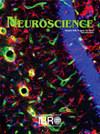Cortical region-specific recovery of auditory temporal processing following noise-induced hearing loss
IF 2.9
3区 医学
Q2 NEUROSCIENCES
引用次数: 0
Abstract
Noise-induced hearing loss (NIHL) studies have focused on the lemniscal auditory pathway, but little is known about how NIHL impacts different cortical regions. Here we compared response recovery trajectories in the auditory and frontal cortices (AC, FC) of mice following NIHL. We recorded EEG responses from awake mice (male n = 15, female n = 14) before and following NIHL (longitudinal design) to quantify event related potentials and gap-in-noise temporal processing. Hearing loss was verified by measuring the auditory brainstem response (ABR) before and at 1-, 10-, 23–, and 45-days after noise-exposure. Resting EEG, event related potentials (ERP) and auditory steady state responses (ASSR) were recorded at the same time-points after NIHL. The inter-trial phase coherence (ITPC) of the ASSR was measured to quantify the ability of AC and FC to synchronize responses to short gaps embedded in noise. Despite the absence of click-evoked ABRs up to 90 dB SPL and up to 45-days post-exposure, ERPs from the AC and FC showed full recovery in ∼ 50 % of the mice to pre-NIHL levels in both AC and FC. The ASSR ITPC was reduced following NIHL in AC and FC in all the mice on day 1 after NIHL. The AC showed full recovery of ITPC over 45-days. Despite ERP amplitude recovery, the FC does not show recovery of ASSR ITPC. These results indicate post-NIHL plasticity with similar response amplitude recovery across AC and FC, but cortical region-specific trajectories in temporal processing recovery.
噪音导致听力损失后听觉时间处理的皮层区域特异性恢复。
噪声诱发听力损失(NIHL)的研究主要集中在听觉通路,但对 NIHL 如何影响不同的皮层区域却知之甚少。在这里,我们比较了 NIHL 后小鼠听觉皮层和额叶皮层(AC、FC)的反应恢复轨迹。我们记录了清醒小鼠(雄性 n = 15,雌性 n = 14)在 NIHL 之前和之后的脑电图反应(纵向设计),以量化事件相关电位和噪声间隙时间处理。在暴露于噪声之前和之后的 1 天、10 天、23 天和 45 天,通过测量听性脑干反应(ABR)来验证听力损失。在 NIHL 后的相同时间点记录了静息脑电图、事件相关电位 (ERP) 和听觉稳态反应 (ASSR)。测量听觉稳态反应(ASSR)的试验间相位一致性(ITPC),以量化AC和FC对嵌入噪声的短间隙同步反应的能力。尽管在 90 dB SPL 和暴露后 45 天内没有点击诱发 ABRs,但 50% 的小鼠 AC 和 FC 的 ERPs 完全恢复到了 NIHL 前的水平。在 NIHL 后的第 1 天,所有小鼠的 AC 和 FC 在 NIHL 后的 ASSR ITPC 都降低了。AC 的 ITPC 在 45 天内完全恢复。尽管ERP振幅恢复了,但FC的ASSR ITPC并没有恢复。这些结果表明,NIHL 后的可塑性在 AC 和 FC 中具有相似的反应振幅恢复,但在时间处理恢复方面具有皮层区域特异性轨迹。
本文章由计算机程序翻译,如有差异,请以英文原文为准。
求助全文
约1分钟内获得全文
求助全文
来源期刊

Neuroscience
医学-神经科学
CiteScore
6.20
自引率
0.00%
发文量
394
审稿时长
52 days
期刊介绍:
Neuroscience publishes papers describing the results of original research on any aspect of the scientific study of the nervous system. Any paper, however short, will be considered for publication provided that it reports significant, new and carefully confirmed findings with full experimental details.
 求助内容:
求助内容: 应助结果提醒方式:
应助结果提醒方式:


